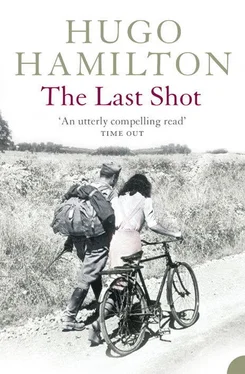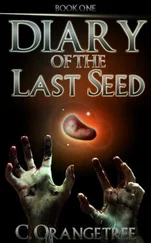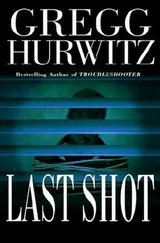They told the old man nothing of what happened. It would have been unfair to burden him with these details. The poor old man wouldn’t be able to sleep at night, thinking about the bodies in the forest. They kept the nightmare to themselves.
It was late afternoon by the time they left to resume their journey. Once more, there was a sense of urgency. They had to get away from the area by nightfall. When they rejoined the road on their bikes, Bertha took one more look at the lake. It looked just the same as it did the day before. A deep blue unbroken surface. For a blind moment, they stopped the bikes and stared, wishing they could erase the day and start all over again from the beginning.
They freewheeled down the hill into the next valley. At the bottom, Bertha asked Franz to stop so that she could throw away the dress she had been wearing earlier. It was torn and stained with blood. It could have been washed and mended, but she was anxious to discard any association with that day.
‘I want to forget that anything happened,’ she said, looking into his eyes.
‘Yes, Bertha. We will say nothing about it. Ever.’
‘We’ll put it all behind us. When we get to America, it will be only a tiny thing in the past.’
She rolled up the dress with a hint of courageous ceremony. Before she went to the ditch along the road, she stopped and turned around again.
‘Do you want to put the gun in as well?’
Franz looked at her. He was reluctant. He thought for a moment, as though the forests were full of enemies. But then he agreed. He placed it in the dress she held out with both hands. Bertha rolled it up and concealed it under a bush.
They cycled on through the evening, for almost seven hours without stopping. Without talking. Without remembering. By the time they got to Bayreuth, it was already dark. Bertha was exhausted. Hungry. Still frightened, but safe. They felt the comfort of reaching such a civilized and cultured town. Wagner’s town. Drowned in culture and peace.
Anke and I kept meeting. Almost every Wednesday, she either came down to Düsseldorf or else we met somewhere else along the way. Sometimes we had lunch and just talked for an hour or two before we parted at the train station again. She had less and less time because of Alex. She was always anxious to get back and pick him up early from the school. He was getting worse.
Once she brought Alex with her, though he was clearly unwell. She thought Alex might enjoy the train journey, it might make him glad. It wasn’t a long trip, only as far as Gelsenkirchen. I was there to meet them. Nothing of what Anke had told me in the past weeks had prepared me for the shock of seeing him arriving in a wheelchair, so weak and thin. He was listless. All his energy had disappeared. I could see he was dying.
He didn’t recognize me. He wouldn’t respond to anything I said.
‘You shouldn’t have brought him,’ I said, when we sat down in a café close to the station. ‘I’m sure it’s too much for him.’
‘I thought the train would make him happy,’ she repeated, stroking Alex on the head. ‘I thought he would like to see you.’
Alex wouldn’t eat anything. He had lost interest in cake, juice, everything. He just sat in his wheelchair, rocking his head from side to side, looking up at his mother. His tongue had gone slack and kept falling out of his mouth. His eyes were red. He didn’t know who I was. He just sang, or moaned, or hummed, with his tongue dribbling saliva down his chin. He stared and ignored the clatter all around him in the restaurant.
Anke couldn’t stay long, obviously. I’d have liked to have taken them somewhere, maybe shown Alex some things, but he wasn’t seeing anything. He didn’t know where he was. And Anke talked urgently about Jürgen, how things had become unbearable at times in the house. They were having these arguments late at night.
‘Does he know you come down here to meet me?’ I asked.
‘I don’t know. Maybe he does. He’s never said anything.’
‘Maybe he’s suspicious. Maybe he has followed you once.’
‘Maybe,’ she said, dismissing it. ‘I don’t think that really is the problem…
‘It’s Alex,’ she whispered. She leaned across the table and explained that Jürgen had rejected any active treatment for Alex’s illness. It was terminal. ‘So now Jürgen is talking about euthanasia. He has nothing against it. He’s positive about it. But I’m not.’
‘But what does he suggest?’
‘I don’t know. He explained it to me, but I couldn’t give you the details. My attitude is that Alex should be given a chance, no matter what it costs. No matter how hard it is on us.’
Anke was clearly upset, whispering to me like this. It was breaking one of her closest principles to talk about Alex while he was present. I asked her more questions. I had dozens of things to ask, but Anke stopped talking.
‘I’ll phone you and talk about it,’ she said.
Then she had to bring Alex to the wash-room. That took a long time, almost half an hour, while I sat in the café thinking. I wished there was something I could do for Alex. I wished there was something I could say that would make him smile, just once.
When they came back, I tried to speak to him, but he didn’t respond. I could think of nothing that might draw him out.
I looked at Anke. I think it was the only time I met her on these visits that she refused to cry. She wouldn’t allow herself to cry with Alex there. It was only alone with me that she could properly grieve about her life.
We talked for a while about Jürgen’s practice. She told me that Jürgen had finally employed another gynaecologist. She would have to be careful now, because Jürgen had more time on his hands. But he was still spending all of his day either in the practice or with Alexander. His energy was boundless.
Anke told me that she and Jürgen still slept together. She still loved Jürgen. Nothing had changed in that respect. And he still loved her. If he knew anything about our weekly meetings, he was accepting it. Maybe he had begun to accept, as I did, that Anke could never be tied down. She thrived on freedom.
She began to tell me about the afternoon when Jürgen came home early from the practice and forced her to make love. She had not rejected him or asked him to stop. But he had forced himself on her like a stranger.
I asked her if it was repulsive to her.
‘It wasn’t that,’ she whispered, leaning over the table again, whispering. ‘It was the way he did it.’
She was reluctant to talk while Alex was there, sitting so passively beside her. Then she felt she had to say it.
‘You know what he did? He raped me. There is no other word for it,’ she said. ‘I think he really wanted it to be like that. He didn’t ask me. He could have asked me and there would have been no problem. But instead he came bursting in and dragged me into the living-room by my hair and then threw me on the floor.’
Anke looked around the restaurant as though she was afraid somebody might be listening.
‘He didn’t talk. He didn’t kiss me or fondle me or anything, he just brutally raped me. He wanted it to be like that. He wanted to act like a complete stranger.’
‘But how?’ I asked. ‘Did you resist or something? Did you try and stop him?’
‘No, no,’ she insisted. ‘I would never do that. Maybe I would play hard to get. But he knows that. No…this time he had obviously made up his mind to rape me. I don’t know where he got the idea, maybe at the practice…
‘He just threw me face down on the floor and said: I’m going to fuck you.’
She was fingering one of the silver milk jugs on the table, perhaps thinking about putting it in her pocket. But she was concentrating on Jürgen.
Читать дальше
Конец ознакомительного отрывка
Купить книгу












